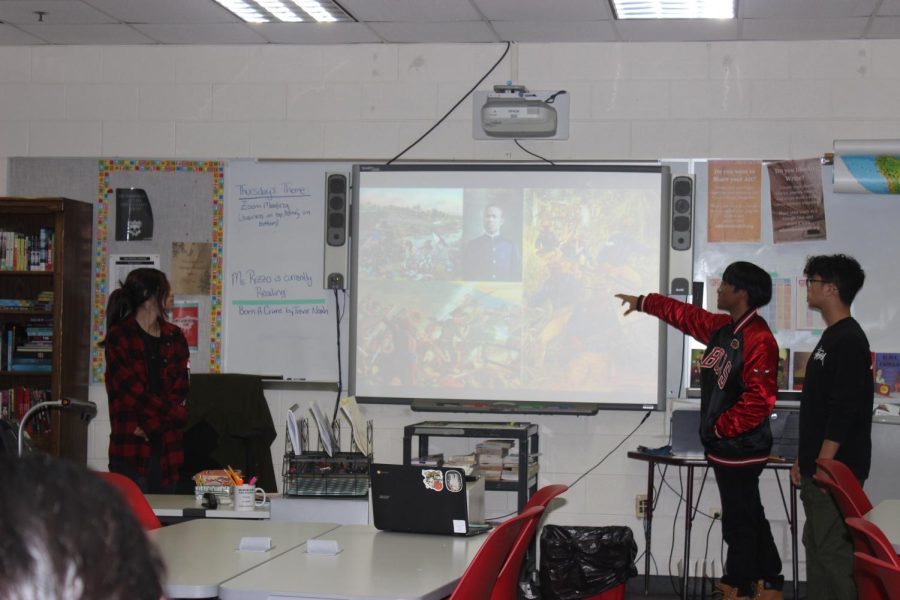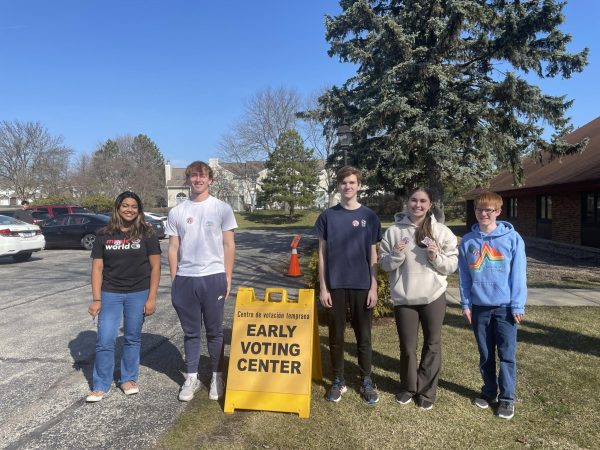Students celebrate Filipino American History Month, discuss heritage and culture
From left to right: Senior Erica Montegrande, president; Junior Ryan Bugaring, member; Junior Jaxson Wasseluk, secretary; give Asian Culture Club a presentation on Filipino American History Month, as well as the history and culture of the Philippines.
November 7, 2022
The start of October not only marks the start of fall, but the beginning of Filipino American History Month (FAHM). Recognized by President Joe Biden, many across the United States are celebrating the month to recognize the “innumerable contributions and rich heritage of Filipino Americans across our nation”
Here at Mundelein, many Filipino students are excited to see the month unfold. Junior Stephanie Aquino notes that FAHM is an important time for Filipinos to be represented.
“Growing up, I wasn’t really surrounded by many Filipinos, because I went to a mainly dominant white school. It feels nice to be represented in a way, even though it’s not really well known,” Aquino said. “It’s still nice to know there’s a month to celebrate my heritage.”
Asian Culture Club President, Senior Erica Montegrande, made sure to highlight FAHM at an Asian Culture Club meeting, and teach the other members about it. In their presentation, Filipino members discuss the history of the Philippines and the importance of their culture.
“I think it’s really important to understand our struggles,” Montegrande said. “Like, the things we had to go through to get where we are today.”
Not only is the history of The Philippines important, but so is describing and explaining Filipino culture. Andrea DeLara, senior, along with Aquino and Montegrande all explain how important food is in Filipino culture; how it helps build community and how they share it with their non-filipino friends.
“A lot of FIlipino culture is the food,” says DeLara.
“Culturally– eat our food,” Montegrande said. “I feel like food for us brings so much, it’s so important to us. Eating together with the family, eating with our hands, sharing food, fighting over food. I feel like food really represents community for us, and brings us together.”
“Culturally, food obviously. I feel like whenever I think of culture, I always think of food,” Aquino remarked. “I make a lot of food with my mom. I like actually sharing that food with my friends, because my friends are very adventurous when it comes to food so I just give them food like ‘try it, you might like it.’”
For DeLara, the month is truly the time to showcase your pride in being Filipino. She says that seeing other Filipinos can help “make people more confident”
“I’m so proud of being Filipino and I love it, and I wouldn’t trade it for anything, but, I think that a lot of people are not proud of their culture,” DeLara said. “ I feel like when you see people who are prideful and not afraid of who they are and expressing their ethnicities, it’s like: ‘wow, that person is really cool and I want to be like them, not ashamed of being Filipino and being different.’”
Not only does showing pride in being Filipino help others feel more confident as well, but it also helps bring people together and form tighter communities.
DeLara said, “[In] the cultural fair last year, I was able to get a whole group of Filipinos– and we’re all so different. But we all just bonded over the fact that we were Filipino, and that made everything so much easier and you were able to create a ton of conversations just over that fact. We just bonded over our similar experiences.”
For anyone who isn’t Filipino, never be afraid to ask questions about the history or culture of The Philippines.
“I grew up in a mainly white school, and I felt like I had this unsaid responsibility to let everyone know that there are other ethnicities other than being European,” said Aquino. “If anyone has questions I always answer, because I like talking about my culture and my identity.”
The most important part of this month for all was the aspect of celebrating how proud they were of being Filipino American.
“I think we should be proud of who we are,” Montegrande said. “Sure, you could celebrate it any other day, but I feel like this month marks something different.”

